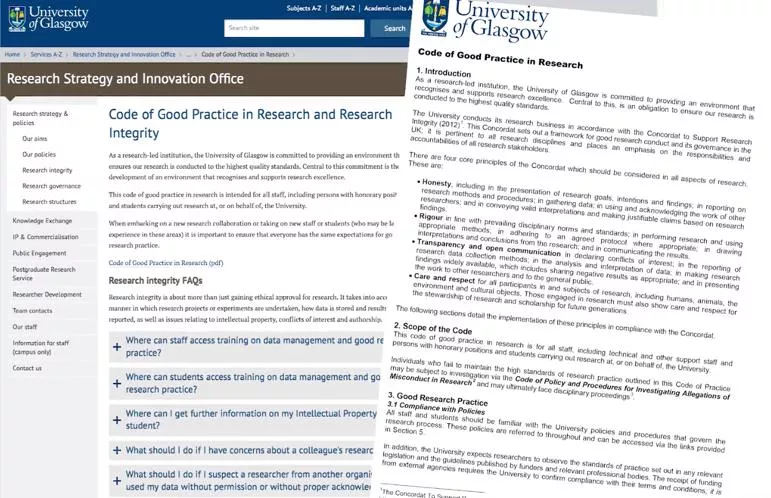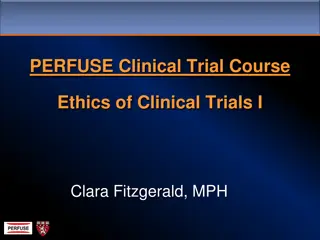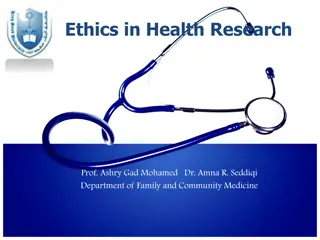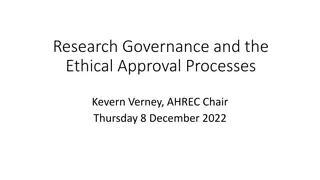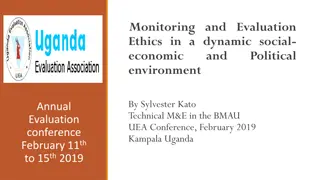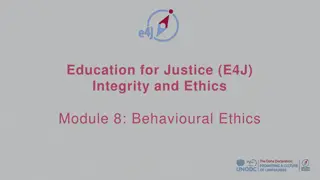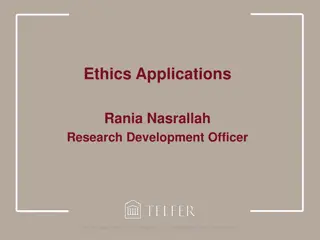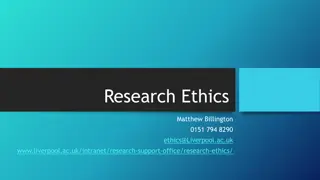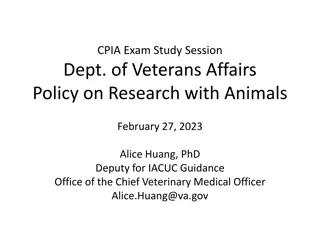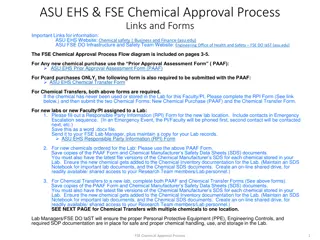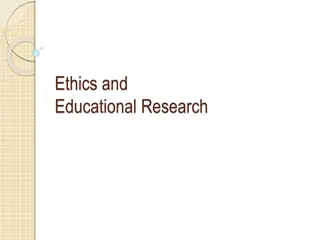Ensuring Ethical Approval for Research: Guidelines and Procedures
Research governance, ethical frameworks, and institutional procedures play crucial roles in ensuring the integrity and quality of academic research. The ESRC Research Ethics Framework outlines key principles for conducting research ethically, emphasizing transparency, participant consent, and risk mitigation. Institutions like the University of Glasgow have strict procedures for obtaining ethical approval before engaging in human data research, highlighting the importance of upholding ethical standards in academia.
Download Presentation

Please find below an Image/Link to download the presentation.
The content on the website is provided AS IS for your information and personal use only. It may not be sold, licensed, or shared on other websites without obtaining consent from the author. Download presentation by click this link. If you encounter any issues during the download, it is possible that the publisher has removed the file from their server.
E N D
Presentation Transcript
INSTITUTIONAL ETHICAL APPROVAL AND YOUR DISSERTATION Susan A. Batchelor School Ethics Convenor
RESEARCH GOVERNANCE The principles and processes by which standards are set in research Intended to improve research and safeguard the public - Research data management - Research integrity - Research ethics
ESRC RESEARCH ETHICS FRAMEWORK Research should be designed, reviewed and undertaken to ensure integrity and quality Research staff and subjects must be informed fully about the purpose, methods and intended possible uses of the research, what their participation in the research entails and what risks, if any, are involved. The confidentiality of information supplied by research subjects and the anonymity of respondents must be respected Research participants must participate in a voluntary way, free from any coercion Harm to research participants must be avoided The independence of research must be clear, and any conflicts of interest or partiality must be explicit
ESRC RESEARCH ETHICS FRAMEWORK The responsibility for conduct of the research in line with relevant principles rests with the principal investigator. The responsibility for ensuring that research is subject to appropriate ethical review, approval and monitoring lies with the institution seeking or holding an award with the ESRC and which employs the researchers performing it, or some of the researchers when it is acting as the co- ordinator for collaborative research involving more than one organisation. Institutions should have clear, transparent, appropriate and effective procedures in place for ethical approval whenever it is necessary. Ethical review should always be proportionate to the potential risk, whether this involves primary or secondary data. Whilst the secondary use of some datasets may be relatively uncontroversial, and require only expedited ethical review, novel use of existing data and especially data linkage may, in some contexts, raise ethical issues. Research involving primary data collection will always raise ethical issues that must be addressed. Breaches of good ethical practice in ESRC-funded research will be treated as a very serious matter by the Council. They could result in the immediate suspension of the individual project and other projects based at or under the coordination of the contracting institution, and a halt to the consideration of further applications from that institution.
UNIVERSITY OF GLASGOW PROCEDURES All research involving human data is subject to University of Glasgow ethical approval University Ethics Committee You must apply for and be awarded ethical approval prior to formal recruitment and data collection College Research Ethics Committee School Ethics Forum
Convenor Susan Batchelor Central & East European Studies Federica Prina SCHOOL ETHICS FORUM (SEF) Economic & Social History Felicity Cawley Louis Bujnoch Maurizio Carbone Chris Claassen Jenny Morrison Neil Munro Tim Peace Politics We are a group of 20 academic staff from across the School of Social and Political Sciences, supported by two admin colleagues, responsible for the ethical review of research within the School. Susan Batchelor Ashli Mullen Giovanni Picker Gerda Reith Kristina Saunders Francesca Scrinzi Sociology In practice, this involves reviewing UG & PGT ethics applications, as well as providing guidance and training on research ethics and the institutional ethics review process. Sohail Ahmad Michelle McGachie Dave McKeever Tunbosun Oyedokun Anastacia Ryan Qunshan Zhao Urban Studies Undergraduate applications & support Lesley Scott Postgraduate applications & support Mhairi Cargill
SEF APPLICATION PROCESS Approve High-risk applications: SEF administrator allocates to two reviewers, 15 day review (Three working weeks) Student may commence data collection immediately Supervisor checks form and accompanying documentation, completes Ethical risks section, and submits final application to SEF administrator Student drafts ethics form in discussion with Supervisor and emails to Supervisor for submission Revisions required Student responds to reviewer comments/makes required revisions in consultation with their Supervisor, who re-submits application Low-risk applications: SEF administrator allocates to one reviewer, 10 day review (Two working weeks) Reject Student may not undertake research, but can resubmit another application after further discussion with their Supervisor
WHAT COUNTS AS HIGH RISK RESEARCH?
HOW DO I APPLY? Students seek ethics approval by completing an application form, which their Supervisor then submits to the School Ethics Forum (SEF) on their behalf: 1. Discuss research ethics issues with your supervisor. 2. Download and complete the appropriate Ethics Application Form from the College Research Ethics page and ensure that you have included the required supporting documentation (for example: Plain Language Statement, Consent Form, Privacy Statement, Interview schedule etc.) 3. Send the form to your supervisor and ask for the comments. Remember that your supervisor MUST complete the Ethical Risks section. 4. Your supervisor must submit the application by email for you: Undergraduate: socpol-ug-ethics@glasgow.ac.uk Postgraduate: socpol-pgt-ethics@glasgow.ac.uk
VISIT THE COLLEGE RESEARCH ETHICS PAGE FOR DETAILED GUIDANCE AND ADVICE, INCLUDING TEMPLATES FOR THE PLAIN LANGUAGE STATEMENT, CONSENT FORM AND PRIVACY STATEMENT: https://www.gla.ac.uk/colleges/socialsciences/students/ethics/forms/undergraduateandpostgraduatetaughtstudents/#ethicsformsandguidancenotes:ugandpgt
Many students do desk-based dissertations that do not need to go through the approval process (e.g. literature review, content analysis etc). DO I NEED TO APPLY FOR ETHICAL APPROVAL? If you will be creating new data with humans (e.g. interviews, observations, questionnaires) you need to go through the ethical approval process, using the Standard Application Form. Unless it is open access, research involving social media data (e.g. Facebook, Twitter, blog posts etc.) and secondary data analysis needs to go through the ethics review process but utilises a different, shorter form the Non-Standard Data application form
IS PRIMARY DATA COLLECTION PERMITTED, UNDER CURRENT COVID19 RESTRICTIONS? (LAST UPDATED 30/09/21) Face-to-face data collection is now permitted for UG and PGT students, subject to risk assessment by the Supervisor. But please note: - If you intend to conduct face-to-face research, you must comply with all relevant Scottish Government or relevant local government social distancing measures in place at the time of the proposed research. - The SEF will expect to see evidence of relevant social distancing requirements and compliance measures before any research is approved. - If lockdowns need to be introduced or re-instated at any point, face-to-face research may not be permitted and so you should develop a contingency plan for your research. All research proposals involving human subjects must be approved by the SEF before data collection commences. This includes both standard first person data collection and nonstandard data collection using social media and other online fora. The benefits of the research must clearly outweigh the risks and burden of research participation for approval to be granted.
CONDUCTING FACE-TO-FACE RESEARCH Establish the current level of risk of COVID-19 in the country and specific location where the research will take place and note any relevant travel restrictions and/or social distancing measures. Identify the specific COVID-19 risks associated with the various aspects of your particular activity - and the measures you will take to mitigate these, e.g. minimising infection risk via use of screening questionnaire when scheduling research appointments, adhering to social distancing/hygiene measures, conducting fieldwork in places that are well-ventilated etc. Consider how you will communicate these measures to potential participants and how you might accommodate participants who feel uncomfortable with face-to-face fieldwork.
CONDUCTING ONLINE INTERVIEWS Consider carefully if the topic is appropriate for an online interview, or if it poses potential risks. If the interview is on a sensitive, traumatic or intrusive topic, you will need to think about the implications this may have for well-being of the participant during and after the interview. How will you ensure (and evidence) informed consent? In most cases, the participant should receive the PIS in advance of the interview, complete an electronic consent form, and email it to the researcher. Consider carefully the setting of the interview so that both interviewer and interviewee have privacy on their devices. Consider carefully how the interview will be recorded, where the recording will be stored, and whether any specific settings will be applied to ensure meetings security.
VIDEO CONFERENCING TOOLS Make sure the tool you use is compliant with GDPR requirements. Do not record confidential data to a cloud server if it is outside the European Union or adequate safeguarding is not in place. If you use the University of Glasgow s Zoom service make sure you enable local recording and that you continue to follow the University s guidance on handling confidential data. Zoom is not recommended for highly confidential or sensitive data; you should use UofG Microsoft Teams instead.
ONLINE SURVEY TOOLS SurveyMonkey, Google Surveys and other commercial survey tools are not supported for University work. If you wish to use an electronic survey tool to conduct your research, the University of Glasgow has an institutional licence for the Online Surveys tool that may be used by PGT (but not UG) students. Please see the University Research Strategy and Policies page on Use of Online Survey Tools for Research for guidance on how to apply to use this. Access is free but by application only. Ethical approval for your research project is required before this access will be granted. The School of Social and Political Sciences also has an institutional licence for Qualtrics, which has advanced functionality (e.g. randomised treatments), which is available to all UG and PGT students in the School with ethical approval for their project. Requests for access should be sent to the SPS Qualtrics Administrator, Christopher Claassen. Microsoft Forms is another supported service that can be used to create simple browser-based surveys, provided under the University's Office365 contract.
USE OF DATA IN THE PUBLIC DOMAIN Published biographies, newspaper accounts of an individual s activities, and published minutes of a meeting would not be considered personal data or sensitive personal data requiring ethics review, nor would interviews broadcast on radio, television, or online and diaries or letters in the public domain. Information provided in forums or spaces on the Internet that are intentionally public may be valid to consider in the public domain , but usually needs to go through formal ethical review to ensure that the relevant ethical issues have been considered and addressed. Ethics review may also be required for analysis of secondary datasets, unless they are open access and do not contain any identifying or sensitive personal data. Whilst material in public archives can be considered to be in the public domain, there may be issues about ownership, publication and confidentiality that require ethical review. If in doubt, approval should be sought using Non-standard data protocol.
SOCIAL MEDIA RESEARCH One of the main ethical issues involved in social media research relates to whether consent of participants is required. The answer is often (but not always) no, and depends upon extent to which data should be considered within the public or private domain. A distinction is usually made between users that have posted information on freely accessible asynchronous forums versus those engaging in synchronous forms of communication and/or using online platforms that accessed through a password or other safeguard. When there is any ambiguity, researchers should consider the extent to which disclosure may have potentially damaging effects for participants, before making a decision about whether or not consent is necessary. As a general rule, the privacy of participants should be respected by removing any potential identifiers and paraphrasing, although an exception is sometimes made in relation to public figures/those posting in an official capacity. If in doubt, approval should be sought using Non-standard data protocol.
KEY POINTS TO TAKE AWAY Ethics review is about heightening risk awareness not preventing high risk research; Ethical review is about encouraging researchers to think through potential ethical challenges; Each research project is considered on a case by case basis but there are key principles; An ethically robust research project may still encounter unexpected ethical challenges; Conducting research involving participants is not an exact science - nor is the ethics review process If you are in doubt, please ask!
FURTHER INFORMATION AND GUIDANCE School ethics pages www.gla.ac.uk/schools/socialpolitical/students/studentinfo/researchet hics/ College ethics pages www.gla.ac.uk/colleges/socialsciences/students/ethics/ UG/PGT Ethics Officer: Susan Batchelor Susan.Batchelor@glasgow.ac.uk UG Ethics Administrator: Lesley Scott socpol-ug-ethics@glasgow.ac.uk PGT Ethics Administrator: Mhairi Cargill socpol-pgt-ethics@glasgow.ac.uk

 undefined
undefined





